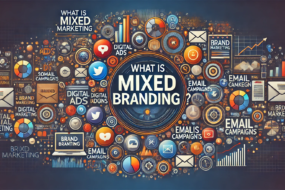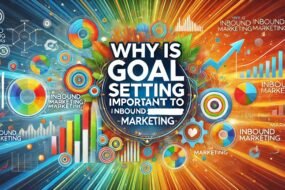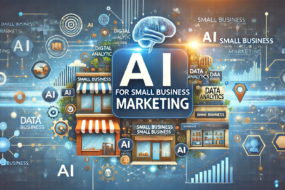
In today’s constantly evolving digital landscape, where technology plays a vital role, the need for information technology (IT) companies has reached unprecedented heights. IT firms are the architects behind the digital infrastructure that powers businesses, governments, and individuals worldwide. However, in this highly competitive arena, more than merely having exceptional technical expertise is required to thrive. Enter the world of “Marketing for IT Companies.”
Marketing for IT companies is not just a buzzword; it’s a strategic necessity. It’s the art and science of promoting technology solutions, services, and expertise to a target audience within and beyond the tech sector.
This blog will explore the intricacies of marketing customized for IT companies. We’ll cover what marketing means for IT firms, why it’s essential, how to address unique challenges, and the best practices. We’ll also delve into the tools necessary for IT company marketing and conclude our journey through this specialized field.
So, whether you’re a seasoned IT professional looking to expand your company’s client base or a newcomer in the tech industry seeking insights into effective marketing strategies, this blog is your comprehensive guide to mastering the art of marketing for IT companies.
Join us as we unravel the strategies and secrets that can drive growth and success in this exciting and ever-evolving field.
What Is Marketing For IT Companies?
Marketing for IT companies is a specialized form of marketing tailored to the unique needs and challenges of businesses operating in the Information Technology (IT) sector.
It employs various strategies and tactics to showcase IT products, services, and expertise to a specific target audience.
Why IT Companies Require Marketing?
IT companies require marketing for several compelling reasons intrinsic to their industry’s dynamics and the broader business landscape.
Here are key reasons why marketing is essential for IT companies:
Competition In The IT Sector
The IT industry is fiercely competitive, with numerous players offering similar products and services. Effective marketing helps IT companies differentiate and stand out in a crowded marketplace. It allows them to showcase their unique value propositions and expertise.
Constant Technological Advancements
Technology evolves rapidly, with innovations emerging regularly. IT companies must continuously update their offerings and adapt to industry changes. Marketing helps them communicate these advancements to their target audience and demonstrate their commitment to staying at the forefront of technology.
Educating Customers
Many IT products and services are complex, Necessitating a specific level of technical understanding for complete comprehension; marketing plays a crucial role in educating potential customers about how these solutions work, their advantages, and how they can resolve specific business challenges.
Building Trust And Credibility
Trust is paramount in the IT sector. Businesses and organizations depend on technology to conduct their operations smoothly and securely. Effective marketing can help IT companies build trust and credibility by showcasing their track record, customer testimonials, case studies, and industry certifications.
Lead Generation And Sales
Marketing activities such as content marketing, lead generation campaigns, and online advertising help IT companies generate leads and convert them into paying customers. Marketing strategies create a pipeline of potential clients, Enabling sales teams to concentrate on finalizing deals.
Brand Building
Establishing a robust brand identity is vital for long-term success. Marketing efforts help IT companies create a recognizable brand that customers associate with quality, reliability, and innovation. A robust brand can also justify premium prices for products and services.
Now that we’ve explored the concept of marketing for IT companies and why it’s indispensable for their success, let’s delve into specific challenges that IT firms face in their marketing endeavors and discover practical solutions to surmount these hurdles.
Understanding Unique Challenges And Overcoming Common Challenges In IT Company Marketing
Challenges: Understanding Unique Challenges
Navigating the marketing landscape for IT companies comes with its unique set of challenges:
Technical Complexity And Rapid Technological Changes
The IT sector grapples with both intricate technical aspects and the relentless pace of technological evolution. Communicating these complexities effectively and staying current with emerging trends are ongoing challenges.
Competition And Security Focus
Standing out in the fiercely competitive IT industry demands a compelling value proposition. Simultaneously, addressing pervasive security concerns, including data breaches and cybersecurity threats, is paramount to instill confidence in potential clients.
Solutions: Overcoming Common Challenges
To overcome these challenges, IT companies can implement several strategies:
Effective Communication And Expertise
Simplify technical jargon, use visuals, and employ analogies to communicate the benefits of your IT solutions. Showcase your deep understanding of current and future tech developments through continuous learning and industry certifications.
Unique Value And Security Focus
Define your IT company’s unique value proposition, emphasizing strengths like exceptional customer support, innovative solutions, or industry-specific expertise. Additionally, prioritize robust cybersecurity measures and firmly commit to data protection by sharing information about your security protocols and certifications to build trust.
Having discussed the challenges and their corresponding solutions, let’s now focus on the best practices paramount in marketing within the IT industry.
Optimal Approaches To Marketing For IT Companies

Developing a Comprehensive Digital Strategy
A comprehensive digital strategy is the foundation of successful IT company marketing. It involves aligning your marketing goals with your business objectives and creating a roadmap that outlines the digital channels, tactics, and resources needed to achieve those goals.
Such a strategy should consider your target audience, industry trends, and competitive landscape. It should also define key performance indicators (KPIs) to measure success. With a well-crafted digital strategy, your IT company can ensure that marketing efforts are cohesive, purposeful, and efficient, driving better results in a highly competitive market.
Targeting the Right Audience
After developing the strategy, addressing the crucial aspect of Reaching the appropriate audience is imperative. The key is identifying and targeting the proper audience in IT company marketing. Your solutions may cater to specific industries or business sizes, so understanding your ideal customer profile is crucial.
By creating buyer personas and segmenting your audience, you can tailor your messaging, content, and outreach efforts to resonate with the individuals or organizations most likely to benefit from your IT offerings. Precision in targeting increases the likelihood of conversion and optimizes your marketing budget by reaching those with genuine interest and need for your products or services.
Content Marketing and Thought Leadership
Once you’ve identified your ideal audience, leveraging your comprehensive digital strategy to engage them effectively is the next crucial step.
Content marketing and thought leadership play pivotal roles in this endeavor. Supplying valuable and informative content, like blog posts, whitepapers, webinars, and expert opinions, establishes your IT company as an authority in the field.
Thought leadership builds trust and credibility and attracts a loyal following of tech-savvy individuals and businesses seeking guidance and solutions. Consistently producing high-quality content that addresses industry challenges and offers innovative insights can set your IT company apart and drive organic traffic to your website.”
SEO and Website Optimization
Once you’ve identified your ideal audience and established your authority through content marketing and thought leadership, the next step is to ensure that your digital presence is easily discoverable by potential customers.
SEO and website optimization are vital for improving search engine visibility, boosting your position on SERPs, and increasing organic traffic.
This involves keyword research, on-page optimization, quality link building, and ensuring your website is mobile-friendly and loads quickly. A well-optimized website enhances visibility and provides a better user experience, helping you convert visitors into leads or customers.”
Utilizing Social Media Platforms
Following optimizing your website for search engines, the next vital step is leveraging social media platforms. Platforms like LinkedIn and Twitter, and even specialized platforms like GitHub or Stack Overflow, Provide valuable chances for interaction and brand visibility in the IT industry.
You can connect with peers, potential clients, and industry influencers using these platforms. Share informative content, participate in relevant discussions, and showcase your company’s culture and achievements. This strategic approach to social media management enhances your company’s online presence, fosters a sense of community, and ensures that you remain top-of-mind within your target audience.
Email Marketing for Lead Generation
Once you’ve optimized your website and effectively used Social media channels like LinkedIn, Twitter, and even specialized platforms such as GitHub or Stack Overflow, email marketing for lead generation is the next crucial step in your IT company’s marketing strategy.
Email marketing remains a potent tool within the IT sector for generating leads and nurturing potential clients. Creating meaningful connections with your audience is possible by developing targeted email campaigns that enable leads, Disseminate valuable content, and endorse your products or services.
Personalizing messages based on recipient behavior and preferences, segmenting your email lists, and utilizing automation to send timely and relevant communications are essential tactics. Building and maintaining a robust email list and delivering content that resonates with your audience can help convert prospects into paying customers over time.”
Online Advertising Campaigns
Strategic online advertising campaigns are another pivotal element in your IT company’s marketing arsenal, building on the foundation of email marketing for lead generation.
These campaigns, such as pay-per-click (PPC) ads and display advertising, can significantly boost your IT company’s visibility and lead-generation efforts. Google Ads and social media platforms accurately target your target audience.
You can ensure a strong return on investment (ROI) while driving traffic and conversions by Creating persuasive ad text, choosing appropriate keywords, and fine-tuning for optimal performance. Ad campaigns. This synergy between email marketing and online advertising amplifies your reach and potential for engaging potential clients effectively.
Building a Strong Brand Identity
Expanding on the discussion of online advertising campaigns, building a solid brand identity is an integral component of your IT company’s marketing strategy. A compelling brand image that reflects your company’s values and strengths is crucial for differentiating yourself in the market.
Developing a memorable logo, defining brand colors, and crafting a compelling brand narrative are steps in this direction. Consistency in branding, both in your online advertising campaigns and across all touchpoints, fosters recognition and trust among your target audience.
Leveraging Customer Testimonials and Case Studies
Continuing from the discussion of brand identity and online advertising campaigns, it’s essential to emphasize the role of leveraging customer testimonials and case studies. In the IT industry, social proof carries immense weight.
You reinforce your brand’s credibility and expertise by showcasing the success stories of satisfied customers through testimonials and in-depth case studies. These real-world examples highlight how your solutions address specific challenges and demonstrate the tangible results your clients have achieved.
This compelling evidence of your capabilities builds trust and confidence among potential clients, making them more likely to choose your IT company for their needs.
Networking and Industry Events
Building on the foundation of leveraging customer testimonials and case studies to establish trust, networking, and participation in industry events further solidifies your IT company’s reputation.
By attending industry events, conferences, and meetups, you gain valuable insights, connect with peers, and position your brand in front of a targeted audience, increasing your chances of forming meaningful partnerships and attracting potential clients.
Competitor Analysis
Understanding your competitors is crucial for positioning your IT company effectively. Conduct thorough competitor analysis to identify their strengths and weaknesses, marketing strategies, and market share. This information enables you to enhance and perfect your approach, find opportunities for differentiation, and develop a competitive edge.
Continuous Learning and Adaptation
As we delve into the importance of understanding your competitors and refining your strategies, we must Highlight the importance of ongoing learning and adaptability within your IT company’s marketing team. The IT industry evolves rapidly, demanding flexibility and a keen eye for emerging trends and shifting customer behaviors. Your marketing efforts can remain relevant and effective in this dynamic marketplace by fostering a continuous learning and adaptation culture.
Measuring and Analyzing Results
Measurement and analysis are essential for evaluating the effectiveness of your marketing efforts. Utilize analytics tools for monitoring crucial performance indicators like website traffic, conversion rates, lead generation, and ROI. Consistently evaluate these metrics to gauge the effectiveness of your marketing efforts. Modify your strategies according to data-driven insights to enhance your marketing optimization—campaigns for better results.
By implementing these best practices, your IT company can develop a robust marketing strategy that enhances visibility, builds trust, generates leads, and drives growth in the competitive IT sector.
Let’s now explore the essential tools necessary for marketing within the IT industry.
Tools For IT Company Marketing

Here are some software and platforms that can simplify marketing efforts for IT companies:
- HubSpot
- Google Analytics
- Mailchimp
- WordPress
- Hootsuite
- Buffer
- SEMrush
- Moz
- Canva
- Adobe Creative Cloud
- Salesforce
These tools cover a range of marketing functions, from analytics and email marketing to social media management, content creation, SEO, and more. IT companies can leverage these solutions to streamline their marketing efforts, improve efficiency, and achieve better campaign results.
Conclusion
Now that you have a comprehensive understanding of marketing for IT companies, there’s no need to keep your IT company at a lower level. Take action today by implementing these strategies and Observe how they can propel growth and contribute to the success of your IT company.
If you still have any questions related to the blog, then feel free to leave them in the comment section. Feel free to ask any questions; we’re here to help.
Thanks for reading 🙂








No Comments